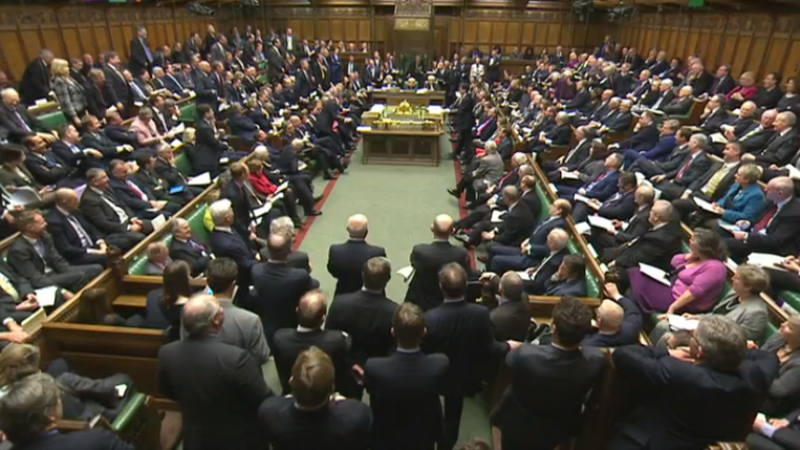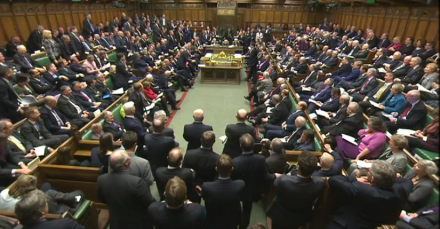

Jeremy Corbyn suffered another mass rebellion last night but it was one he walked into, fully aware, because he wanted to demonstrate to the country at large about his willingness to accept Brexit and to push through its inevitable next step, the triggering of article 50.
Picking a fight with your own side to send a message to the rest of the country was a tactic beloved by Tony Blair – remember his “modernise or die” speeches to the trade unions – but the strategy is not the main concern today, rather it is the question of what happens next.
Corbyn, as always, seems relatively calm about the turmoil of the last 24 hours. He seemed unperturbed about the revolt against his authority last night and told the BBC today that the resignation of Clive Lewis was “not a disaster”. In the end there was another huge revolt against his authority, with 52 MPs voting against the three-line whip, but this was only marginally up from the 47 who rebelled in last week’s second reading vote on the Brexit bill.
In the context of Corbyn’s leadership this is shocking but not surprising. He knows the fundamental disagreements between him and many MPs on policy and political tactics are not going to go away. What is more worrying for him, and the party, is the loss of several more shadow cabinets ministers in the last week, culminating in the departure of Lewis, who quit the shadow business brief with a “heavy heart” yesterday.
There is now a considerable list of former shadow cabinet ministers just from the Brexit row alone – Lewis, Jo Stevens, who resigned as shadow Welsh secretary, Rachael Maskell, from Defra, Dawn Butler, who spoke for diverse communities, as well as Tulip Siddiq, who quit a junior shadow post in the education team.
Each of these MPs had their own genuine reasons for going and, as Corbyn readily acknowledged, there are huge difficulties for pro-EU MPs who represent Remain constituencies in being asked to walk through the lobbies with Tory Brexiteers to deliver a policy over which they have serious worries. Each of newly “ex”-frontbenchers was entitled to act according to their conscience.
The wave of resignations though, at a time when Labour is still at a low ebb in the polls – stuck in the mid-20s – makes it harder for our party to act as an effective Opposition.
This is not just important today, not just because Britain is going through some standout changes with Brexit, but because more shifts will follow. And if the next election is not held until 2020 then it may not be one dominated by the EU debate but by the very traditional dividing lines on jobs and the economy, public spending, the NHS, schools, crime and immigration.
Labour needs to be able to fight the Tories’ torrid reforms today, tomorrow, the day after and the year after.
So the challenge for Corbyn is to knit together a functioning Opposition as quickly as possible. That means a swift decision on the future of the shadow minister and three whips who rebelled but who have not resigned and a quick and conclusive reshuffle of the shadow cabinet.
And for those in the parliamentary Labour Party (PLP) who did not want to serve under the Corbyn then more is asked. When the PLP’s talent is spread between the front and back benchers then those MPs without a shadow position have a big role to play in holding the Tories to account. Many are already doing this convincingly, such as Yvette Cooper, the former shadow home secretary, who delivered a stinging verdict on Theresa May’s u-turn on child refugees when she asked an urgent question today of May’s successor, Amber Rudd.
Yes the Tories are ruthless. And the fact the Brexit drama has played out for Labour in such a painful manner has surprised many. But Labour needs to be tougher on the Tories than ever before. Brexit is highly likely to go ahead and, as it does, the PLP must be relentless in fighting a prime minister who in eight months has shown herself to be weak, contradictory, calculating and – as proved by today’s announcement on refugees – quite cowardly.




More from LabourList
‘Labour’s quiet quest for democratic renewal’
‘Labour promised to make work pay. Now it must deliver for young people’
‘Council Tax shouldn’t punish those who have the least or those we owe the most’